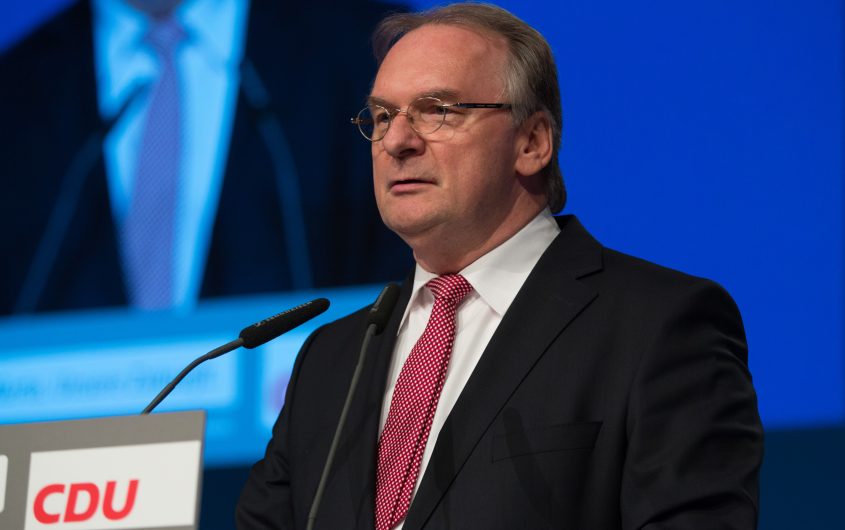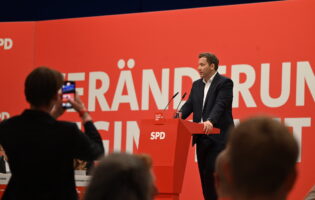
Olaf Kosinsky / kosinsky.eu
What Happens in Magdeburg Does not Stay in Magdeburg

Eric Langenbacher
Senior Fellow; Director, Society, Culture & Politics Program
Dr. Eric Langenbacher is a Senior Fellow and Director of the Society, Culture & Politics Program at AICGS.
Dr. Langenbacher studied in Canada before completing his PhD in Georgetown University’s Government Department in 2002. His research interests include collective memory, political culture, and electoral politics in Germany and Europe. Recent publications include the edited volumes Twilight of the Merkel Era: Power and Politics in Germany after the 2017 Bundestag Election (2019), The Merkel Republic: The 2013 Bundestag Election and its Consequences (2015), Dynamics of Memory and Identity in Contemporary Europe (co-edited with Ruth Wittlinger and Bill Niven, 2013), Power and the Past: Collective Memory and International Relations (co-edited with Yossi Shain, 2010), and From the Bonn to the Berlin Republic: Germany at the Twentieth Anniversary of Unification (co-edited with Jeffrey J. Anderson, 2010). With David Conradt, he is also the author of The German Polity, 10th and 11th edition (2013, 2017).
Dr. Langenbacher remains affiliated with Georgetown University as Teaching Professor and Director of the Honors Program in the Department of Government. He has also taught at George Washington University, Washington College, The University of Navarre, and the Universidad Nacional de General San Martin in Buenos Aires, Argentina, and has given talks across the world. He was selected Faculty Member of the Year by the School of Foreign Service in 2009 and was awarded a Fulbright grant in 1999-2000 and the Hopper Memorial Fellowship at Georgetown in 2000-2001. Since 2005, he has also been Managing Editor of German Politics and Society, which is housed in Georgetown’s BMW Center for German and European Studies. Dr. Langenbacher has also planned and run dozens of short programs for groups from abroad, as well as for the U.S. Departments of State and Defense on a variety of topics pertaining to American and comparative politics, business, culture, and public policy.
__
Saxony-Anhalt’s 2021 Landtag Election
In the weeks preceding Sunday’s elections for the Landtag in the eastern state of Saxony-Anhalt, there was a rising sense of dread that the right-populist Alternative for Germany (AfD) would end up being the strongest party in that state parliament. Polls taken right before the election had the Christian Democrats only 1 percentage point ahead of the AfD. Moreover, there have been numerous instances of polling underestimating support for the AfD (and right-populist parties more generally) for a variety of possible reasons. In short, there was good cause to fear that the unthinkable would happen and that for the first time ever, the AfD would have the initial right to try to form a government. The magnitude of this potential outcome was not lost on the international press.
But in the end, everyone besides AfD supporters was relieved and even surprised with the resounding victory of the incumbent senior coalition partner, the CDU and its Minister-President Reiner Haseloff. The CDU finished the night with 37 percent of the vote and 40 out of 97 seats, just nine seats short of the majority. This was an unexpected 7.2 percent increase from the 2016 result. The party also won every single constituency with the exception of Zeitz in the far south of the state. The AfD, in contrast, garnered 20.8 percent of the vote (22 seats), more than 3.5 percent less than in the last election—and 6-7 points below where they were polling. The Left Party had a bad night, losing 5 percent with only 11.2 and the SPD declined by 2.3 percent for a measly 8.3 percent of the vote. The Greens and the FDP marginally increased their share to 6.1 and 6.4 percent, but this was enough for the Liberals to re-enter the state parliament. The voting participation rate was 61.6 percent, a small increase from 2016.
Coalition formation will be interesting given that the incumbent “Kenya” combination (CDU, SPD, and Greens) is no longer numerically necessary for a majority. The easiest path would likely be a CDU-SPD coalition with a bare majority of 49 seats. But Haseloff could also continue the widely derided and unstable Kenya coalition, or opt for a “Jamaica” variant (CDU, Green, FDP), both with slightly larger majorities of 56 or 54 seats. Alternatively, he could try for a CDU minority government tolerated by a combination of the SPD, FDP, or Greens.
This election has immediate consequences at the national level. Most importantly, the CDU and its leader and chancellor candidate Armin Laschet are strengthened.
Besides who will wield power in Magdeburg for the next five years, this election—the last regional election before the Bundestag election in late September—has immediate consequences at the national level. Most importantly, the CDU and its leader and chancellor candidate Armin Laschet are strengthened. The second-guessing around the choice of Laschet for both posts will now be muted—the centrist, continuation of Merkel’s course is validated. This will reduce the sniping from the CDU right (Friedich Merz et. al) and from Markus Söder’s CSU in Bavaria. The party will likely coalesce around Laschet and fight hard for victory in September. Just as importantly, the periodic discussions about needing to work (informally) with the AfD, especially at the Land level in the east, are now on the backburner. This will deprive leftist parties of an attack point during the Bundestag election campaign. Naturally, many say that this good result for the CDU says more about the popularity of Haseloff (in power since 2011) in Saxony-Anhalt than it does about Laschet and his vision for the party. That is true to an extent, but defying predictions, Laschet also was not a hindrance in this election—and often that is enough in politics.
The Greens and their chancellor candidate, Annalena Baerbock, have had a dose of reality served to them. The momentum and temporary polling supremacy proved to be short-lived. The likelihood of the Greens seizing the chancellorship is much lower now. The Greens did improve in Saxony-Anhalt over their 2016 result, but a just under 1 percent increase is lackluster and certainly does not support a narrative of surging momentum. The party has traditionally done worse in the east than the west, but it will need to increase its share of the eastern vote in the Bundestag election if it will have any chance to be the largest party. I expect a further slight decline in the Greens national polling and some second-guessing of the choice of the relatively inexperienced Baerbock as chancellor candidate over her nationally more popular and more seasoned co-leader, Robert Habeck.
The timing of this election and its impact on various narratives and the momentum of the parties and candidates are actually quite substantial.
The other big question is the future of the AfD. From one perspective, despite the scandals, leadership turmoil, incendiary rhetoric, and (partial) government surveillance, it still scored about 21 percent of the vote. If the glass is half empty, this shows that the party is increasingly entrenched in the (eastern) party system. This will also support the view that most AfD voters are “lost” to the mainstream parties for some time if not forever. If the glass is half full, this is a bad, perhaps, fatal result for the insurgent party. No longer having seemingly invincible momentum and with other outsider or protest vote options now available (the Freie Wähler, for example), the party’s moment may have passed—especially because migration and multiculturalism are not the salient issues that they were in 2016 or 2017. Perhaps now the internal fissures and government scrutiny will be enough to deliver the coup de grâce.
Otherwise, the Left Party is increasingly looking like a relic—a ghost of its former self in the East. The SPD continues its gradual decline despite the relative popularity of its chancellor candidate, Olaf Scholz, and quite a few policy achievements at the national level. The FDP looks sustainably reinvigorated and will likely retain its 12-13 percent in the national polls.
Pundits always say that one should not read too much into regional election results—especially in a small, eastern state like Saxony-Anhalt with only 2.2 million people (not even 3 percent of Germany’s population). But, the timing of this election and its impact on various narratives and the momentum of the parties and candidates are actually quite substantial. Especially in this election year—the most competitive and uncertain since 2005 or 2002—what has happened in Magdeburg will certainly not stay in Magdeburg.









